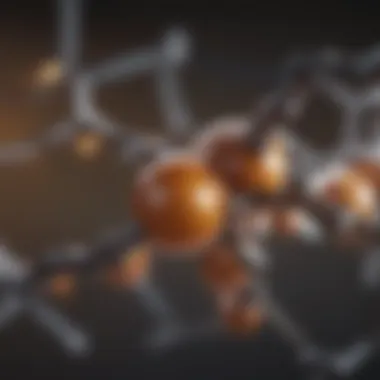Caffeine's Role in Headaches: A Double-Edged Sword


Intro
Caffeine occupies a unique position in contemporary culture. Many people rely on it for energy and focus. However, its relationship with headaches is quite complex. While caffeine might help relieve some types of headaches, particularly tension headaches, it can also worsen others, especially those associated with withdrawal.
Understanding this intricate relationship requires exploring how caffeine interacts with the body. It is particularly important for those who suffer from chronic headaches or migraines to grasp these dynamics. Hence, this article aims to dissect the dual role caffeine plays in headache management, providing valuable insights for various stakeholders in health and wellness.
Wellness Insights
Exploring Caffeine’s Role in Headaches
Caffeine specializes in constricting blood vessels. This characteristic plays a central role in headache physiology. When used in moderation, caffeine can prove to be effective in managing headaches. For some individuals, the immediate relief is palpable; the tension decreases, and clarity is restored. The mechanism often facilitates the efficacy of certain medications, like those used for migraines. However, frequent consumption can backfire. Individuals who consume high levels risk developing a dependency. Withdrawing from caffeine may lead to withdrawal symptoms, which commonly include headaches.
Preventive Measures
For those prone to headaches, managing caffeine intake is crucial. Here are some practical suggestions:
- Gradually reduce caffeine intake if dependency is suspected.
- Maintain a consistent daily routine with caffeine to avoid spikes in consumption.
- Stay hydrated, as dehydration may also contribute to headache onset.
"Moderation is key in caffeine consumption; too much can indeed lead to headaches while too little can trigger withdrawal."
Nutrition Information
The Impact of Diet on Headaches
Caffeine is not the only dietary component to consider. A balanced diet can influence headache frequency and severity. Certain foods are known triggers for some individuals. Monitoring what you eat can be just as important as managing caffeine intake. Foods rich in magnesium, for example, may help avert migraines.
Balanced Diet Essentials
To stave off headaches, consider incorporating these foods:
- Leafy greens: Spinach and kale are beneficial for their nutrient content.
- Nuts: Almonds and cashews provide magnesium.
- Whole grains: Oats and brown rice offer sustained energy without spikes.
- Hydrating fruits: Watermelon and cucumbers help maintain hydration.
Meal Planning and Preparation
Being intentional with meal planning is essential. Aim for balanced meals that provide consistent energy throughout the day. A well-structured diet supports not just headache management, but overall well-being.
Prelims to Caffeine and Headaches
The exploration of caffeine's impact on headaches is critical to understanding its dual role in health. Caffeine is often hailed for its ability to enhance alertness and boost energy levels, yet it also holds a complex relationship with headache disorders. This section delves into that relationship, providing clarity on how caffeine can sometimes be a trigger for headaches, and at other times, a remedy.
The Nature of Caffeine
Caffeine is a central nervous system stimulant found in coffee, tea, and various soft drinks. It operates predominantly by blocking adenosine receptors in the brain. Adenosine is a neurotransmitter that promotes sleep and relaxation. By inhibiting this action, caffeine promotes alertness and increases energy levels.
In moderate amounts, caffeine can improve cognitive functions. However, the effects vary significantly among individuals due to genetic differences in metabolism. Some people might experience headaches after consuming caffeine due to its vasoconstrictive properties. This means it can narrow blood vessels, which might worsen headaches for some.
Understanding Headaches
Headaches are categorized into several types, including tension-type, migraines, and cluster headaches. Each has different triggers and underlying mechanisms. Tension-type headaches are the most common, often linked to stress and muscle tension. Migraines, on the other hand, are more complex and involve a neurological component, including fluctuating neurotransmitter levels and changes in cerebral blood flow.


Headaches can be classified as primary or secondary. Primary headaches occur independently, whereas secondary headaches arise from underlying health issues, including dehydration or caffeine withdrawal. Understanding these distinctions is key in assessing how caffeine interacts with each type and informs treatment strategies.
The relationship between caffeine and headache severity is multifaceted and deserves thorough examination. This exploration aims to clarify these aspects, helping individuals comprehend when caffeine may alleviate rather than exacerbate headache conditions.
Mechanisms of Caffeine in the Body
The exploration of how caffeine interacts with physiological systems is vital in understanding its effects on headaches. Caffeine acts on the central nervous system and influences various pathways that can either relieve or trigger headache symptoms. By analyzing its mechanisms, we can draw clearer lines between caffeine consumption and headache outcomes. This section will focus on three primary mechanisms: neurotransmission, vascular changes, and metabolism of caffeine in the body.
Caffeine and Neurotransmission
Caffeine is known to enhance neural activity. It primarily works by blocking adenosine receptors, which are integral in regulating sleep and wakefulness. Adenosine naturally promotes drowsiness, and by inhibiting its effects, caffeine can lead to increased alertness. However, this mechanism also has implications for headaches.
In headache sufferers, particularly those with migraines, altered neurotransmission can paint a complex picture. For instance, the withdrawal from caffeine can cause heightened sensitivity to pain. In a state of withdrawal, the balance of neurotransmitters is disrupted. This disruption can make an individual more susceptible to headache triggers. Thus, the interaction between caffeine and neurotransmission is a double-edged sword, capable of both alleviating and worsening headache experiences.
Vascular Effects of Caffeine
Caffeine can influence the vascular system, which is essential when considering headaches, especially tension-type and migraine headaches. Caffeine causes vasoconstriction, meaning it can narrow blood vessels. This effect can often lead to pain relief as it counters the vascular dilation known to occur during certain types of headaches.
However, this effect can vary among individuals. While some may experience relief, others may find that excessive caffeine intake can lead to an increase in vasodilation after the vasoconstrictive effects wear off. Therefore, understanding this vascular response is crucial for individuals managing recurrent headaches. The relationship between vascular reactions and headache severity is intricate and requires careful consumption of caffeine.
Caffeine Metabolism
Caffeine is metabolized in the liver by cytochrome P450 enzymes, predominantly CYP1A2. The rate at which individuals metabolize caffeine can significantly influence its effects on headaches. Depending on genetic factors, some people may metabolize caffeine quickly, while others do so slowly.
Slow metabolizers may find that caffeine leads to prolonged effects and potential side effects, including headaches. Conversely, rapid metabolizers might experience fewer adverse effects from moderate caffeine consumption. Understanding one's metabolism can be crucial in navigating caffeine consumption, particularly for those who suffer from frequent headaches.
In sum, the mechanisms of caffeine in the body can significantly influence whether it aggravates or alleviates headache symptoms. The interplay between neurotransmission, vascular functions, and metabolism emphasizes the necessity of personalized approaches to caffeine consumption.
Types of Headaches
Understanding types of headaches is crucial in exploring the relationship between caffeine and headache severity. Each type of headache presents unique symptoms and underlying mechanisms. Knowledge of these types can help in identifying the best management strategies. Particularly for those who suffer from headaches, distinguishing between the various types may allow for tailored approaches to caffeine consumption. Moreover, recognizing how caffeine impacts each type is essential for effective pain management and prevention.
Tension-Type Headaches
Tension-type headaches are the most common form of headache. They often manifest as a dull, aching sensation on both sides of the head. Individuals may feel tightness around the forehead or neck. These headaches can occur due to stress, anxiety, or muscle tension.
Though tension-type headaches may not be primarily caused by caffeine, their management can be affected by its intake. Some people find relief from mild symptoms with caffeine, as it can have mild analgesic properties. But, caffeine is not a cure. Overreliance on caffeine could lead to complications, potentially triggering more frequent headaches due to increased tolerance or withdrawal effects. It's important for individuals to monitor their caffeine use carefully when experiencing tension headaches.
Migraine and Caffeine
Migraines are more severe than tension headaches and often come with additional symptoms such as nausea or sensitivity to light and sound. Caffeine plays a complex role in migraines. Some studies suggest that caffeine can provide relief for certain individuals, especially during the early phases of a migraine attack. This effect may occur because caffeine can constrict blood vessels, which is beneficial when dealing with migraine-related vasodilation.
However, the same caffeine that may help can cause issues if used excessively. Some chronic migraine sufferers report that reducing caffeine intake is necessary to prevent rebounds and overuse headaches. The dose and timing of caffeine consumption can significantly alter its effects, making it essential for those prone to migraines to approach intake with caution.
Cluster Headaches
Cluster headaches are among the most intense and painful types. They often occur in cyclical patterns or clusters and can be accompanied by tearing of the eyes and nasal congestion. The relationship between cluster headaches and caffeine is less straightforward. While caffeine is often not a primary component of treatment, some evidence suggests it can help alleviate symptoms for certain individuals during an attack.
That said, cluster headaches typically require specialized treatment plans. Individuals suffering from cluster headaches should consult a healthcare professional before making any changes to their caffeine intake. Understanding personal triggers and how caffeine fits into the broader treatment strategy remains paramount.
It is clear that caffeine's effects on headaches vary significantly by type, and thus, individualized approaches to caffeine consumption are necessary.


Caffeine as a Headache Relief
Caffeine plays a complex role in the context of headache relief. Many individuals are aware of caffeine's dual nature; it can alleviate headaches but also intensify them in some cases. An understanding of how caffeine interacts with headache physiology is vital. Caffeine's presence in the bloodstream can enhance certain analgesic effects, making it a crucial element in pain relief strategies.
When discussing caffeine as a headache remedy, it is essential to explore specific elements. The role of caffeine in medications, for example, is noteworthy. Its ability to potentiate other analgesics enhances their effectiveness, making it a common ingredient in headache over-the-counter drugs.
On the other hand, while caffeine can offer immediate relief, it provides short-term benefits that require careful consideration. Understanding both the advantages and the conditions in which caffeine might worsen headaches gives valuable insight for individuals who often suffer from these conditions.
Caffeine in Analgesics
Caffeine is often included in analgesics for its synergistic effect. In medications like Excedrin, which combines acetaminophen and aspirin with caffeine, the latter helps improve the overall pain-relieving effect. Studies show that caffeine enhances the absorption of these drugs, allowing for quicker relief from headaches. This makes caffeine an effective co-analgesic that can augment the efficacy of other pain relievers.
- The combination can lead to a faster onset of action.
- Caffeine may reduce the amount of analgesic needed for pain relief, lowering the risk of potential side effects from higher doses of medication.
- This mechanism is particularly relevant for migraine sufferers, who often seek quick and effective relief.
However, it's essential to note that excess caffeine consumption can lead to tolerance, reducing its effectiveness as a pain reliever over time.
Short-Term Benefits of Caffeine
The short-term benefits of caffeine are significant, particularly for those prone to certain headache types, like tension-type and migraine headaches. Caffeine can lead to rapid symptom relief. Some people even report experiencing a noticeable decrease in headache intensity within 30 minutes to an hour after consumption.
- Caffeine's vasoconstrictive properties can decrease cerebral blood flow, that may help alleviate certain types of headache pain.
- The sense of alertness it promotes can enhance cognitive function, which often suffers during headache episodes.
Nonetheless, these benefits come with caveats. Regular caffeine consumers can experience withdrawal headaches if they suddenly decrease their intake. The risk of rebound headaches also looms large for individuals who use caffeine as a quick fix. This paradox makes careful monitoring of caffeine usage crucial for individuals who suffer recurring headache episodes.
"Understanding the role of caffeine in pain relief is essential for anyone prone to headaches. The right approach can lead to effective management of symptoms."
In summary, caffeine does provide headache relief through its role in analgesics and through its short-term benefits. Recognizing this can guide individuals in making informed choices regarding their caffeine consumption.
The Double-Edged Sword of Caffeine
Caffeine, while a popular stimulant with various benefits, can be a complex subject when it comes to headache management. On one hand, it has been shown to alleviate certain types of headaches, such as tension-type or migraines, thanks to its vasoconstrictive properties and effects on neurotransmitters. On the other hand, it can also contribute to the severity and frequency of headaches in some individuals. It is crucial to understand this dual nature to grasp how caffeine can influence headache experiences.
The primary benefit of caffeine is its ability to enhance the effectiveness of many over-the-counter pain relievers. This can provide significant relief for those already prone to headaches. However, with frequent use, the body can develop a dependency, leading to withdrawal symptoms that include headaches when caffeine is not consumed.
Moreover, understanding the nuances of caffeine consumption is essential. Determining the threshold for one’s personal tolerance and the context of usage—whether for relief or as an everyday stimulant—can make a significant difference in headache patterns.
"Caffeine acts as a double-edged sword; its benefits must be balanced with the consideration of potential negative effects."
Caffeine Withdrawal and Headaches
Caffeine withdrawal occurs after a regular consumer abruptly reduces or stops intake. Symptoms can arise within 12 to 24 hours, peaking between 20 to 51 hours following cessation. Headaches are a prominent aspect of withdrawal, characterized by dull, throbbing sensations. This discomfort happens as the body adjusts to the absence of caffeine’s stimulating effects on the central nervous system.
During withdrawal, blood vessels that had constricted under the influence of caffeine begin to dilate. This change increases blood flow to the brain, leading to changes in intracranial pressure that can trigger headaches. Additionally, neurochemical changes contribute. Caffeine typically enhances the release of dopamine, and its absence may lead to an imbalance in neurotransmitter levels, which can also provoke headaches.
Overuse and Rebound Headaches
Caffeine overuse can lead to rebound headaches, commonly referred to as medication-overuse headaches. These occur when individuals consume pain relievers containing caffeine too frequently to combat chronic headaches. Initially, caffeine can provide relief, but over time, increased usage can change the pain threshold, leading to more frequent and severe headaches when the medication is not taken.
Recognizing rebound headaches is critical, particularly among individuals with chronic headache disorders. The best approach is to limit caffeine intake and establish a consistent routine when dealing with headaches. Reducing reliance on caffeine as both a preventative and a treatment allows the body to reset its natural pain regulation mechanisms.
In summary, while caffeine provides certain benefits regarding headaches, both withdrawal symptoms and overuse must be properly managed. Adjusting intake can help in navigating the complexities of caffeine's role in headaches, ultimately leading to better management strategies for those vulnerable to headache disorders.


Research Surrounding Caffeine and Headaches
Understanding the relationship between caffeine and headaches is crucial due to the widespread use of caffeine as a common stimulant and its paradoxical effects on headache symptoms. Throughout this exploration, we aim to illuminate how research has shaped our understanding of coffee, energy drinks, and various sources of caffeine regarding headache occurrences. This section will delve into clinical studies, analyze findings on caffeine sensitivity, and assess implications for those who regularly deal with headaches.
Clinical Studies Overview
Numerous clinical studies have sought to illuminate the complex interaction between caffeine and headaches. Research often highlights that caffeine can serve a dual purpose. On one side, it may provide relief for headache sufferers, especially for tension-type headaches and migraines. Conversely, excessive caffeine consumption has been shown to trigger or exacerbate headaches for many individuals.
Several pivotal studies have indicated that caffeine may enhance the efficacy of analgesics in headache treatment. For instance, a study published in the Journal of the American Medical Association showed that caffeine could intensify the effectiveness of over-the-counter pain relievers for migraine treatment. Meanwhile, other research indicates that people have varied responses to caffeine, making it essential to understand individual tolerance levels when considering caffeine consumption.
Findings on Caffeine Sensitivity
Caffeine sensitivity varies significantly among individuals, which is central to understanding its impact on headaches. Some people may experience heightened sensitivity, leading to headaches from even minor caffeine intake. Others might tolerate higher doses without adverse effects. Genetic factors, habitual consumption, and existing medical conditions often dictate this sensitivity.
Moreover, studies have indicated marked differences in caffeine metabolism among people. Some individuals metabolize caffeine rapidly, while others do so slowly. This variation can influence both the benefits and side effects experienced. For those with slower metabolism, caffeine might increase the risk of triggering headaches or amplifying existing ones.
This nuanced view of caffeine sensitivity underscores the importance of personalized approaches in dietary habits. Knowing one’s own tolerance can empower individuals to manage their head pain more effectively.
"Caffeine’s effects vary from person to person, underlining the significance of personal experience in headache management."
Practical Implications for Caffeine Consumption
Understanding how caffeine interacts with headaches is crucial for many who experience this common ailment. Caffeine can act as both a remedy and a trigger, making it essential for individuals to be aware of their consumption habits. This section will explore the elements that shape responsible caffeine consumption, focusing on benefits, risks, and personalized strategies that may affect headache occurrences.
Assessing Personal Caffeine Intake
To begin managing caffeine effectively, self-assessment is vital. Individuals should track their daily caffeine consumption, noting how much they intake from beverages like coffee, tea, energy drinks, or even chocolate. The following steps can help in this assessment:
- Keep a Journal: Document each drink and the time consumed. This provides clarity on consumption patterns.
- Identify Triggers: Note any correlation between caffeine intake and headache episodes. Recognizing patterns can inform future decisions.
- Consider Tolerance Levels: Understand that caffeine sensitivity can vary significantly from person to person. Some may tolerate higher doses without issue, while others may find that even small amounts trigger headaches.
"Adjusting caffeine intake could lead to improved well-being for those prone to headaches."
Guidelines for Individuals Prone to Headaches
Once individuals have assessed their caffeine consumption, establishing guidelines is essential for managing headaches. These guidelines should take into consideration not only personal sensitivity but also the context of overall health. Here are some recommendations:
- Limit Intake: Aim for no more than 200-400 mg of caffeine a day. This amount is generally considered safe and may reduce the risk of headaches.
- Timing of Consumption: Avoid consuming caffeine later in the day. This helps prevent sleep disturbances that may contribute to tension headaches.
- Stay Hydrated: Caffeine acts as a diuretic, which can lead to dehydration. Ensuring adequate water intake counteracts this effect and may help prevent headache onset.
- Monitor Withdrawal Symptoms: Gradually reduce caffeine intake if headaches occur more frequently. Sudden withdrawal can result in rebound headaches.
- Consult a Professional: If headaches persist, consideration should be given to consulting a healthcare provider or a dietitian familiar with headache management.
By following these personalized guidelines, individuals can better navigate the complexities surrounding caffeine consumption and its effects on headaches.
End
Understanding the connection between caffeine and headaches is crucial for individuals who frequently experience these painful episodes. This article highlights the dual role caffeine plays; it can serve as both a remedy and a potential trigger for headaches. The nuances of this relationship lie in its various mechanisms of action within the body.
Summarizing Key Takeaways
Caffeine has a complex relationship with headaches. Here are the essential points to take away:
- Caffeine can provide relief for certain types of headaches, especially tension-type and migraines, often found in over-the-counter medications like Excedrin.
- Sensitivity to caffeine varies among individuals. Some may find minimal effect, while others see notable improvements or worsening of symptoms.
- Withdrawal and overuse can lead to rebound headaches. This is why it's essential to monitor overall caffeine intake.
- Identifying personal triggers may help manage caffeine consumption and its effects on headaches effectively.
"Caffeine is not universally beneficial; its effects depend on individual physiology and contextual factors."
Future Areas for Research
There are several avenues for further exploration regarding caffeine and headaches:
- Research could focus on genetic factors that determine caffeine metabolism and sensitivity, which might clarify why some people experience migraines more frequently than others.
- Longer-term studies examining the effects of chronic caffeine consumption could shed light on its overall impact on headache frequency and severity.
- Investigating the synergistic effects between caffeine and other pain relief medications could lead to more effective treatment protocols.
- Further studies on individual differences in response to caffeine can refine recommendations for personalized headache management strategies.



